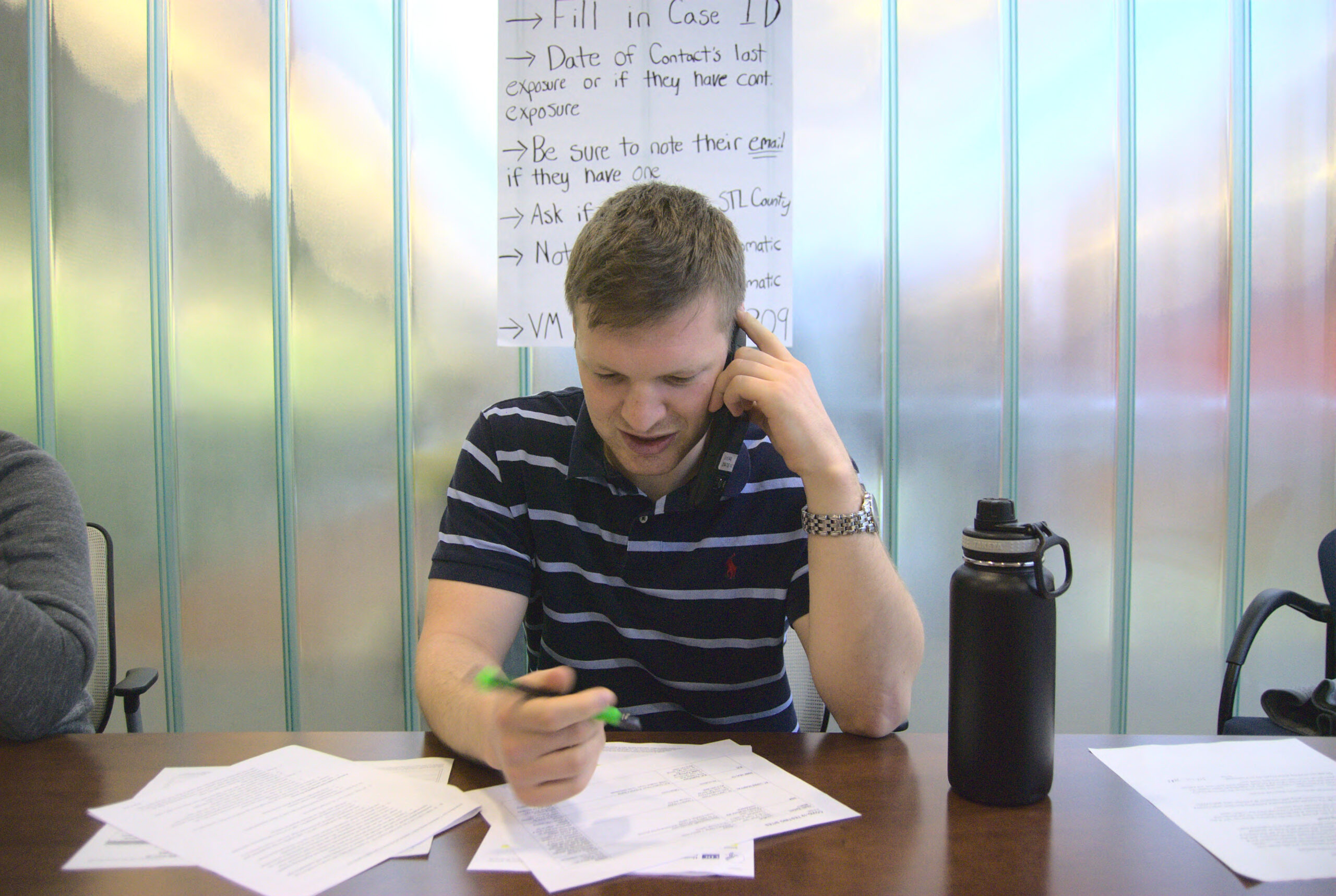Medical students assist health departments in tracking COVID-19
Case investigation, contact tracing helps control coronavirus outbreaks
Huy Mach and Gaia RemerowskiWashington University medical student Sharon Abada is one of more than 100 students at the School of Medicine who has undergone training to become a volunteer contact tracer for the St. Louis County or St. Louis city health departments.
As the St. Louis region grapples with reopening businesses and lifting stay-at-home orders, more than 100 students at Washington University School of Medicine in St. Louis have been volunteering to help local health departments perform case investigations and contact tracing, which are essential public health strategies to contain the spread of the novel coronavirus.
The time-intensive method helps control outbreaks of COVID-19 — as it has other infectious diseases — by identifying everyone an infected patient has had contact with, and then notifying and monitoring them for illness. If not sick, identified contacts are instructed to quarantine and are monitored for symptoms. If sick, the contacts are to isolate themselves and are told where to seek testing and treatment, as needed. They then are asked to provide all of their recent contacts so that the tracing process may continue.
“As the St. Louis region faced the first wave of COVID-19 in March, it became clear that the tried and true epidemiologic practices of case investigation and contact tracing would be key to reducing transmission in our region,” said Steven J. Lawrence, MD, an associate professor of medicine in the Division of Infectious Diseases and a university leader tasked with helping control the outbreak through education, communication and coordination of response activities across the Danforth and Medical campuses. “Our medical students learned of our health departments’ need for volunteer contact tracers and immediately mobilized to help fill the need.”
Medical students have volunteered 10 to 40-plus hours per week at the city of St. Louis Department of Health and the St. Louis County Department of Public Health, and more than a dozen students have signed up to help this summer. “Their generosity, energy and talent have made a meaningful and substantial contribution to our region’s pandemic response,” said Lawrence, also the medical school’s assistant dean of curriculum and clinical sciences.
“We are fortunate to have Washington University as a community partner helping to improve health outcomes in the city,” added Franda Thomas, the St. Louis health department’s COVID-19 incident commander. “The medical students assisting with COVID-19 contact tracing have been instrumental in our disease-investigation efforts.”
Three months ago, Sharon Abada was a third-year medical student in the middle of her clinical rotations at Barnes-Jewish Hospital when COVID-19 abruptly ended all nonessential operations and shifted classes to online learning.
Immediately, she underwent training and volunteered as a case investigator and contact tracer for the St. Louis County Department of Public Health.
“My classmates and I wanted to learn whatever we could about the virus and do whatever we could to try to contain it,” said Abada, who has a master’s degree in public health. “Case investigation and contact tracing allow us to witness firsthand the perspectives of the coronavirus on patients and people potentially exposed to the virus. It is emotionally stressful to call people with COVID-19 or people who have family or friends in the hospital or who have died from it. The experience emphasizes the importance of compassion in medicine.”
Many of the people she called confided their vulnerabilities.
“I’m lost, confused and scared,” one person told Abada, she recalled. “I don’t know what to do.”
“Yes, the pandemic is scary and confusing,” Abada responded. “What you’re going through is a unique experience in history. But we’re here for you, and we’re going to help you through it, and we have resources we can give you to help you stay safe.”
Abada later reflected: “These types of conversations have had a profound effect on me. I’m learning about the kind of person I want to be in my community as well as the kind of physician I aspire to be with my patients.”
Sometimes, the telephone calls last 20 minutes; other times, two hours.
Always, the phone conversations enlighten.
“It is humbling to talk to people with COVID-19,” said Bruin Pollard, who will be a second-year medical student in the fall and has been a leader in organizing student response to the pandemic. “I can hear the fear and worry in their voices. I can hear that they’re just not feeling well. The experience has helped me to be sensitive to people going through tough times. It’s made medicine more real.”
Medical students make excellent case investigators and contact tracers because they’re knowledgeable about human health and tend to keep updated on the latest scientific research, said Spring Schmidt, acting co-director of the St. Louis County’s health department. “It has been such an amazing partnership to have dedicated student volunteers with knowledge of health to work with us as we have been addressing this pandemic. We have sincere gratitude to Washington University’s students and faculty.”
Volunteer efforts with the health departments extend behind the scenes, too. For example, Christina Herbosa, along with other students, helped increase the efficiency of case investigation and contact tracing in St. Louis County by building a secure, online database and surveys for investigating and monitoring COVID-19 cases. The county’s health department uses the database.
“Case investigators were using paper charts, and files were piling up,” said Herbosa, a soon-to-be fourth-year medical student with a master’s degree in population health sciences. “Moving it online sped up the process which, I hope, helped to slow down the spread of COVID-19. As a medical student, I want to help however I can.”
 Jason Morris
Jason Morris





